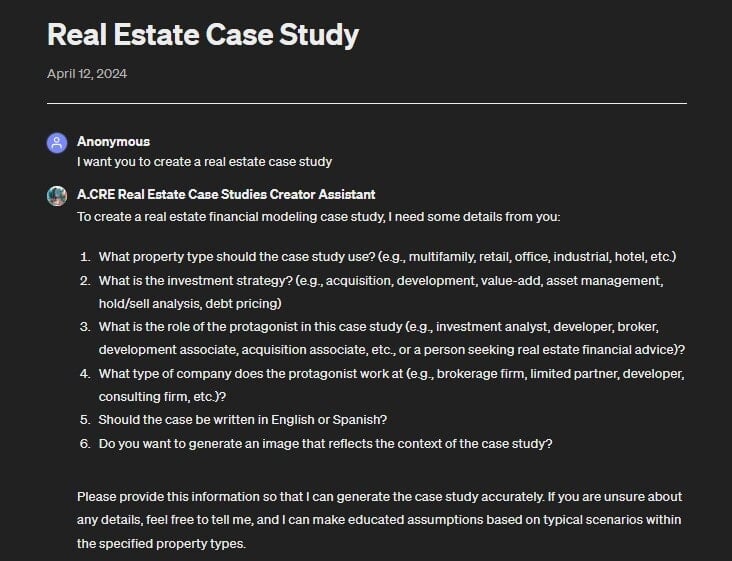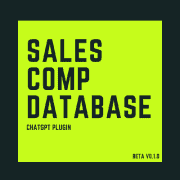Real Estate Case Studies Creator Assistant – Custom GPT by A.CRE (Updated Oct 2024)
If you’ve spent any time following us here at A.CRE you know that AI applications in real estate financial modeling is a topic we are fascinated (and excited) about! As a consequence, we’re underway with several initiatives to explore AI in commercial real estate and help A.CRE readers and Accelerator members prepare for the impact of AI on our industry. One such initiative is our ongoing development of custom AI tools for CRE. And so, as part of that initiative, we are thrilled to share our readers with a new custom GPT we built: the Real Estate Case Studies Creator Assistant!
Created by A.CRE team member, Arturo Parada, this tool aims to offer real estate professionals additional underwriting and decision-making practice for real-life CRE investment scenarios. It also is a great tool for real estate hiring managers wanting to assess the real estate financial modeling skills of their prospective employees as well as for candidates wanting to hone their skills before that all-important real estate technical interview!
And so, without further ado, we present to you the A.CRE Real Estate Case Studies Creator Assistant custom GPT!
- Note: Custom GPTs are now available to both paid and free users of ChatGPT. Click here to learn more.
Why we built the Real Estate Case Studies Creator Assistant GPT?
As our CRE community knows, understanding real estate deal mechanics and cash flows and knowing how to underwrite those are essential skills for all who want to enter and thrive in the industry. The A.CRE Accelerator teaches exactly how to do that, yet we are often asked by Accelerator members and graduates how they can gain additional practice. Since the beginning of A.CRE, we have added practice cases to our real estate case study library for a number of scenarios.
However, we are constantly asked for more case studies by users in a number of different roles and investment scenarios. After all, each case modeled by a real estate finance professional helps them hone the necessary skills and experience to better handle future investment analyses or prepare for the next technical real estate interview. In other words, much like learning how to play a new instrument, practice makes perfect!
We built this custom GPT to help A.CRE readers and our Accelerator members practice analyzing deals. Training the GPT involved running dozens of tests and with each test re-training the GPT to provide better case study outputs. As of its initial release, it produces pretty decent case studies. Nevertheless, we’ll continue to improve the GPT and share those changes in the version notes found at the bottom of this page.
Access the Real Estate Case Studies Creator Assistant GPT
The A.CRE Team developed this custom GPT as a service to its readers and the industry. OpenAI currently only makes custom GPTs accessible to paid ChatGPT Plus, Teams, and Enterprise users.
We regularly update the GPT (see version notes).
Click to chat with the A.CRE Real Estate Case Studies Creator Assistant and use simple instructions such as “I want you to create a real estate case study”. Note that as with all generative AI applications, there may be output mistakes, and you’ll want to double-check the information.
User’s Guide – Real Estate Case Studies Creator Assistant GPT
To use the Real Estate Case Studies Creator Assistant effectively, follow these steps:
- Specify the Property Type: Choose from multifamily, retail, office, industrial, or hotel. This selection will determine the context and specifics related to the property in the case study.
- Define the Investment Strategy: Options include acquisition, development, value-add, asset management, hold/sell analysis, and debt pricing. Your choice here influences the financial strategies and outcomes discussed in the case.
- Identify the Protagonist’s Role: Possible roles are investment analyst, developer, broker, development associate, acquisition associate, etc. This helps personalize the case study, making it relevant to your professional scenario or interest.
- Choose the Type of Company: Indicate whether the protagonist works at a brokerage firm, is a limited partner, a developer, a consultant, etc. This detail helps in crafting realistic corporate dynamics and decision-making processes.
- Select the Language: Determine whether the case should be written in English or Spanish. This choice tailors the geographical context relevant to the language.
- Decide on Visuals: Confirm whether you want an image that reflects the context of the case study. This could be useful for presentations or more interactive learning environments.
- Provide Additional Information: If there are specific details or scenarios you want to include, such as financial constraints, market conditions, or geographical specifics, mention these to further customize the case study.
By providing clear answers to these points, you can receive a tailored real estate financial modeling case study that fits your educational or professional needs perfectly!
- Check out a real estate case study created by the A.CRE Real Estate Case Studies Creator Assistant.
Video Walkthrough – Real Estate Case Studies Creator Assistant GPT
To further help you get started using this custom GPT, below find a video walkthrough. The video shows three possible scenarios for using the GPT:
- Young Professional looking to create case studies to help them practice and learn real estate financial modeling.
- Real Estate Finance Professor wanting to create case studies for class projects and lectures.
- Hiring Manager looking to develop technical exams for real estate proficiency testing.
Use Cases for the Real Estate Case Studies Creator Assistant GPT
1. Practice Real Estate Financial Modeling
This tool is an invaluable resource for those eager to practice and refine their real estate financial modeling skills. It offers a hands-on approach that is essential for personal development and mastery of the field. Users can specifically craft case studies to simulate scenarios they are interested in or expect to encounter in their professional lives.
This customization allows users to focus on particular areas of interest or challenge, making the practice sessions as relevant and effective as possible. This feature is particularly beneficial for both newcomers and seasoned professionals looking to enhance their proficiency and confidence in making strategic real estate decisions.
2. Proficiency Assessment for Employers
This tool serves as a powerful resource for prospective CRE employers to assess candidates’ proficiency in real estate financial modeling and analysis. By integrating this tool into the recruitment process, employers can conduct detailed evaluations of a candidate’s skills through customized scenarios that mirror real-world financial challenges and decision-making situations at their firm. Thus, the tool helps the employer source the right talent for the role.
3. Scenario Analysis for Students and Professionals
In each real estate case study generated by this tool, students and professionals have the opportunity to delve into and explore the outcomes of various investment strategies, producing detailed financial analyses that enable a deeper understanding of the risks and potential returns associated with each investment. The tool allows users to customize scenarios based on specific market conditions, investment parameters, and strategic objectives they wish to explore.
This level of customization supports a dynamic learning environment where users can experiment with different financial scenarios and strategies, seeing firsthand how changes in assumptions or external factors could impact investment outcomes. Such insights are crucial for developing a nuanced understanding of the complex interplay between market dynamics and investment decisions in the real estate sector.
4. Role-Specific Insights for Career Development
Whether you are considering a career as an investment analyst, developer, broker, acquisitions associate, or seeking a deeper understanding of financial advisory roles within CRE, each practical case created by our tool is designed to simulate specific real-world tasks and challenges pertinent to these roles. This feature is particularly beneficial for individuals exploring career options or contemplating a shift within the CRE sector. It provides a clear insight into the practical aspects of various roles, helping you better understand the responsibilities and day-to-day activities involved, thereby preparing you for real-life situations and informed career decisions.
5. Educational Resource for Classrooms and Professors
Real estate professors can leverage this tool to create engaging and highly customizable exercises that significantly enhance classroom learning. It allows for the design of tailored scenarios that align with course objectives, enabling students to apply theoretical knowledge in simulated real-world situations. This adaptability makes it a valuable educational aid for a variety of teaching styles and curriculum requirements.
Professors can use the tool to demonstrate the impact of economic changes, market dynamics, and strategic decisions in real estate, offering students a dynamic learning environment where they can experiment with and understand complex concepts through practice. This hands-on approach helps bridge the gap between theory and practical application, fostering a deeper understanding and appreciation of the intricacies of real estate financial modeling and decision-making.
Stay Tuned – Mini Case Studies for the Glossary of CRE Terms
In addition to the A.CRE Real Estate Case Studies Creator Assistant, we want to help both new and established CRE professionals put context to the most common terminology used in the industry. To that end, we have started to add mini-case studies to each term in the Glossary of CRE Terms.
With these mini cases, readers will not only learn the straightforward definition of each term but will have a chance to really see in context how the term is used in practical scenarios commonly seen in the CRE industry. Check out the Glossary page for Zero Cash Flow Property to see an example of one of these ‘mini-cases’ in practice.
Frequently Asked Questions about the Real Estate Case Studies Creator Assistant GPT
Version Notes
v1.1
- Added functionality to create an Offering Memorandum for the case study
v1.0
- Initial release











